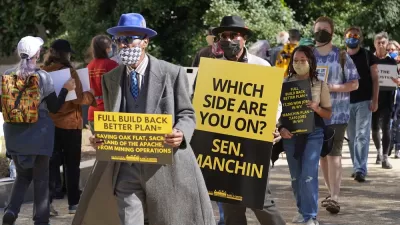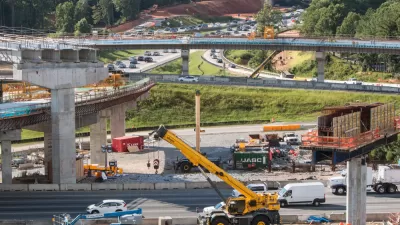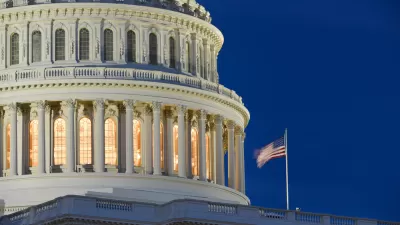A final vote of 69-30, with 19 Republicans joining their Democratic colleagues in the Senate, will send the Infrastructure Investment and Jobs Act to the House.

"The US Senate passed a historic, sweeping $1.2 trillion bipartisan package on Tuesday to shore up the nation’s crumbling infrastructure with funding for priorities like roads, bridges, rail, transit and the electric grid," report Ali Zaslav and Clare Foran.
The article also touts the bill as "a major achievement for both parties and President Joe Biden."
Here's how the article breaks down the $550 in new federal spending over five years included in the Infrastructure Investment and Jobs Act:
- $110 billion in roads, bridges, and major projects
- $66 billion in passenger and freight rail
- $65 billion to rebuild the electric grid
- $39 billion to modernize and expand transit systems
- $7.5 billion to build a national network of charging infrastructure for electric vehicles
- $55 billion for water infrastructure (including $15 billion for replacing lead pipes).
CNN's tally leaves more than $200 million of the total off the itemized list, however, and the actual sum of the investments in this bill have been something of a shell game for month now (it's a $1.2 trillion bill with $550 million in new spending, for example—the remaining total goes to current federal authorizations for public works, including highway spending). In the planning realm, pundits and advocates have disputed the extent of the bill's investments in the systems contributing to climate change for months now. Sam Mintz, transportation reporter for Politico took to Twitter to this morning to total the spending on highway programs at $303.5 billion, a 35 percent increase over current levels.
A separate article by Heather Long provides more detail and focus on the spending proposed by the Infrastructure Investment and Jobs Act.
Democratic officials—with at least some stake in the Biden administration's campaign pledge to "Build Back Better" by ending and reversing the well documented social and environmental consequences of the infrastructure and transportation status quo—have focused messaging on the smaller sums for ostensibly progressive causes, like the money for broadband, electric cars, and drinking water. Republicans are pointing to the money for bridges and roads and the permitting reforms included in the bill. The vote, and all of the statements, takes place just one day after the International Panel on Climate Change released a report offering proof of the "unequivocal" connections between human activities, like those enshrined by this bill, and quickly accelerating, catastrophic changes in the climate of the planet.
The Infrastructure Investment and Jobs Act will now head to the House of Representatives, which won't be able to take a vote until it returns from recess at the end of August. "Speaker Nancy Pelosi has indicated that the chamber won’t take up the bipartisan bill until Senate Democrats pass a separate and more expansive package without GOP votes under the budget reconciliation process, a stand that has been met with criticism from Republicans and pushback from some moderate Democrats," report Zaslav and Foran.
Additional reporting on the Senate's vote on the Infrastructure Investment and Jobs Act is available from NBC News and the Associated Press.

Trump Administration Could Effectively End Housing Voucher Program
Federal officials are eyeing major cuts to the Section 8 program that helps millions of low-income households pay rent.

Planetizen Federal Action Tracker
A weekly monitor of how Trump’s orders and actions are impacting planners and planning in America.

Ken Jennings Launches Transit Web Series
The Jeopardy champ wants you to ride public transit.

Washington Legislature Passes Rent Increase Cap
A bill that caps rent increases at 7 percent plus inflation is headed to the governor’s desk.

From Planning to Action: How LA County Is Rethinking Climate Resilience
Chief Sustainability Officer Rita Kampalath outlines the County’s shift from planning to implementation in its climate resilience efforts, emphasizing cross-departmental coordination, updated recovery strategies, and the need for flexible funding.

New Mexico Aging Department Commits to Helping Seniors Age ‘In Place’ and ‘Autonomously’ in New Draft Plan
As New Mexico’s population of seniors continues to grow, the state’s aging department is proposing expanded initiatives to help seniors maintain their autonomy while also supporting family caregivers.
Urban Design for Planners 1: Software Tools
This six-course series explores essential urban design concepts using open source software and equips planners with the tools they need to participate fully in the urban design process.
Planning for Universal Design
Learn the tools for implementing Universal Design in planning regulations.
Heyer Gruel & Associates PA
Ada County Highway District
Institute for Housing and Urban Development Studies (IHS)
City of Grandview
Harvard GSD Executive Education
Toledo-Lucas County Plan Commissions
Salt Lake City
NYU Wagner Graduate School of Public Service






























